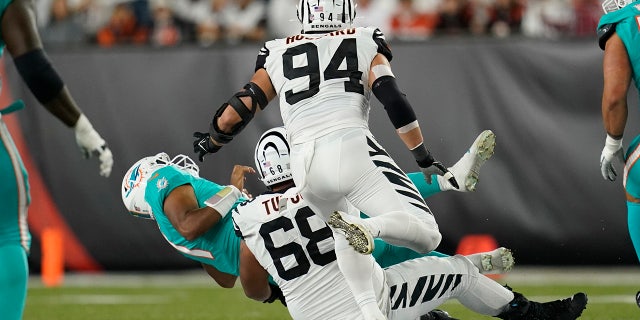
Tua Tagovailoa and the hard truth of showing replays
I’ve been writing a lot lately about what gets said — and, far more notably, about what does not get said — during NFL broadcasts. Why does this matter? Because what is said during games has a far bigger impact than any studio show given the massive viewership of NFL telecasts. Last month in this column, I led with the following: “How far can a media rightsholder partner go criticizing NFL owners on a game broadcast?” I asked readers: “When was the last time you watched an NFL game where game announcers were critical of ownership? Not some cursory remark but an in-depth conversation on an issue of relevance?” I’m still waiting for some examples. My colleague, Kalyn Kahler, wrote a piece following the Browns-Steelers game that examined something that regularly happens on NFL game broadcasts — the lack of specificity and depth when it comes to issues that look unfavorably on the league.
So I had been thinking about this subject prior to Miami Dolphins quarterback Tua Tagovailoa being slammed into the Paycor Stadium turf last Thursday night. The NFL Players Association has since terminated the unaffiliated neurotrauma consultant involved in Tagovailoa’s concussion check while the NFL and the NFLPA released a joint statement Saturday night agreeing to modify the league’s concussion protocols based on conversations around the use of the term “gross motor instability.” The Athletic has written multiple pieces on Tagovailoa, including NFL writer Mike Jones on concussion protocol and culpability and Bill Shea on how Amazon handled Tagovailoa’s injury.
My topline thoughts on Amazon’s broadcast last week would not be much different than what you have already read from thoughtful people. I found the game announcers underwhelming on the subject of Tagovailoa’s injury. The system is designed to get you to the next play. There are millions of fans who suggest that the game is not the place for a long discussion of something such as a brain injury. I’m not here to change anyone’s mind. I respect that view. But none of this should be surprising because, at the core, the networks are partners with the NFL. They are in business together, especially on game coverage.
But there was one thing that aired last Thursday night that I thought was honest. In fact, it was the most honest thing I witnessed in the three-plus-hour broadcast. That was the decision by Amazon’s production truck to show a half-dozen-or-so replays of Tua’s injury that included some high-def closeups. This was honest sports television, the violence of pro football unvarnished. It was painful and uncomfortable to watch. But it was real. (I recommend this excellent piece by Kyle Koster of The Big Lead on it.).
The NFL has always come with an inherent tension as a viewer. The sport is thrilling, a near-perfect television experience, but those who play it suffer for our escapism. I agree with Koster that we owe it to the players to not close our eyes on pro football’s ills. One can have nuance and balance on the topic without wanting to ban the sport entirely.
I understand I’d be in the minority among NFL viewers when it came to Tua’s replays — and I have colleagues at The Athletic and former ones I respect immensely who were very public about saying Amazon went too far. But NFL game producers have told me for years that the singular charter they have is to chronicle the game on the field. To gloss over the uncomfortable is to not fulfill the charter you claim is most important.
On Sunday, I emailed Chris Nowinski, a co-founder of the Concussion Legacy Foundation and a frequent critic of the NFL, to ask how he views replays when someone hits the ground in a way associated with brain injury. How does he see the tension of the images versus the discomfort of seeing them and a viewer’s desire for escapism?
“I usually look away when I see a knee explode or a bone break,” Nowinski said. “It dredges up memories of pain from previous injuries of my own. It also doesn’t teach us anything we don’t already know, so it’s mostly about the spectacle. However, replays with brain injuries don’t bring up those memories because you don’t have nociceptive pain nerves in your brain, so most concussions are painless. As seen by what happened to Tua Tagovailoa last Sunday, concussions can be difficult to recognize, even for doctors. Therefore, showing replays that allow us to see how concussions happen, as well as the signs athletes show that suggest they need to be removed, provides value to the public by training the audience to recognize concussions in their own lives and protect their children.”
If you are a current (or future) broadcaster or journalist interested in The Concussion Legacy Foundation Media Project, whose goal is concussion education for journalists, you can click here for more information.
I reached out privately to Rich Ohrnberger, who played guard for the Patriots, Cardinals and Chargers during a six-year career and is now a sports host in San Diego, to thank him for providing insight to NFL viewers through his Twitter feed. Former NFL players now in sports media really provide a service when they offer first-hand perspective on how injuries get handled. Same with former All-Pro lineman Mitchell Schwartz, who has been tremendous on this subject.
Credit to ESPN’s Sunday NFL Countdown for giving Stephania Bell three minutes of uninterrupted air time to offer viewers a high-level education on concussion education and objective testing. “The challenge with brain injuries is they are like snowflakes,” Bell said. “No two are alike.”
Below, tweets from Nowinski, less than six hours apart. I recommend this two-part interview with Nowinski last week with The Dan LeBatard Show.
I thought this was very good from “Sunday Night Football” analyst Rodney Harrison.